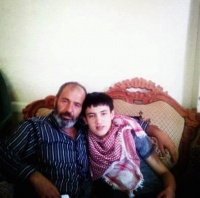Home » Kuwait » Press Releases » PAL/ISR - News » Palestine: 14-year-old Amer Bajawi Released After Serving Full 4 Months Sentence For "Throwing Stones"
"We are very happy to hear that Amer was reunited with his family," says Inès Osman, Legal Officer for the Mashreq at Alkarama, "but we remain concerned about the broader practice of judicial harassment of Palestinian youths, who should never be sentenced by a military court; this goes against every principle of international human rights law."
Amer's arrest and detention
Amer was arrested on 23 May 2015 by the Israeli Defence Forces (IDF) while he was playing with a friend in the Palestinian city of Jenin in the northern West Bank. After his arrest, he was taken to the Hewara military detention centre, also in the northern West Bank, before being transferred three days later to Majdo prison, located in northern Israel 30 km southeast of Haifa, making it virtually impossible for his family to visit him, as they could not access this region.
On 28 May, Amer was presented before a military judge with hands and feet cuffed and showing visible signs of ill-treatment on his face. He was charged with "throwing stones" on 9 June and sentenced by a military court, after a speedy trial on 28 July, to four months of imprisonment and a fine of 3,000 Shekel (about 800 US dollars).
Although Alkarama is pleased to know that Amer returned home safely, the organisation regrets the unfair trial to which he was submitted. As documented by Alkarama, Amer was detained for several days without trial before being sentenced to four months imprisonment by a military court for "throwing stones, targeting a settler's car, breaking into a military checkpoint and endangering the lives of soldiers," all acts which the minor denies having committed.
Violations of Amer's rights
During the entire period of his pre-trial detention, Amer was prohibited from communicating with his family and he was only allowed to see a lawyer for the first time during his first hearing before a military judge, in clear violation of his right to prepare an adequate defence. Despite the flaws in his trial and the several appeals by his family and NGOs requesting his release, Amer was only released after serving his full sentence.
Alkarama wishes to recall that Amer's case fits into a broader pattern of judicial harassment of Palestinian youths, who are systematically arrested without any legal basis and brought before the military justice system, in violation of the UN Committee on the Rights of the Child (CRC)'s jurisprudence according to which juveniles should be tried before separate courts.
Concerned over the widespread practice of arbitrary detention against Palestinians, especially minors and human defenders, and the constant violation of Palestinian detainees' rights in Israeli prisons, Alkarama calls upon the Israeli authorities:
- To actively reform its judicial system in order to put it in line with international human rights standards; and
- To put an end to the systematic ill-treatment of Palestinian detainees, especially children, who come in contact with the military detention system.
For more information or an interview, please contact the media team at This email address is being protected from spambots. You need JavaScript enabled to view it. (Dir: +41 22 734 1008).
 Algeria
Algeria Bahrain
Bahrain Djibouti
Djibouti Egypt
Egypt Iraq
Iraq Palestine/Israel
Palestine/Israel Jordan
Jordan Kuwait
Kuwait Lebanon
Lebanon Libya
Libya Mauritania
Mauritania Morocco
Morocco Oman
Oman Qatar
Qatar Saudi Arabia
Saudi Arabia Sudan
Sudan Syria
Syria Tunisia
Tunisia United Arab Emirates
United Arab Emirates Yemen
Yemen Other Countries
Other Countries


